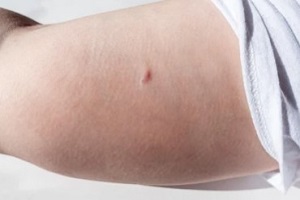 Nexplanon is a form of contraception, or birth control. It is a small, plastic rod about the size of a matchstick that is inserted under the skin of your upper arm. Nexplanon is a contraceptive that protects against pregnancy for up to 3 years.
Nexplanon is a form of contraception, or birth control. It is a small, plastic rod about the size of a matchstick that is inserted under the skin of your upper arm. Nexplanon is a contraceptive that protects against pregnancy for up to 3 years.
If you have decided to elect Nexplanon insertion, for post-procedure, physicians recommend to follow the “7-day Rule” for combined use with another form of birth control contraceptive to avoid pregnancy.
How does Nexplanon work?
After insertion of a Nexplanon implant, progestin is released. This is a hormone that stops the release of an egg from the ovaries during the ovulation phase of the menstrual cycle. Nexplanon works by thickening the mucus within the vaginal canal and cervix, thus preventing sperm from entry to the uterus.
Procedurally performed by a doctor, a Nexplanon implant can be replaced immediately once an earlier insertion is removed. Nexplanon contraception does not block pregnancy if removed and not replaced. Therefore, it is possible to become pregnant shortly after Nexplanon removal.
The 7 Day Rule
When scheduling an appointment, the timing of a Nexplanon implant insertion is important. If the procedure is performed within the first 5 days of a patient’s menstrual period, no back-up birth control method is required.
If the implant is performed after the 5th day of a patient’s menstrual period, a condom or other back-up method should be used for the first 7 days after insertion. If already employing a physician prescribed contraceptive method such as the piil, patch or ring, usage should be continued for 7 days after Nexplanon implant surgery.
Preparation for a Nexplanon Procedure
The Nexplanon implant is an in-office procedure that requires about 10 minutes. Preparation begins with cleaning of the arm with an antiseptic solution, followed by an anesthesia injection to reduce pain.
 Nexplanon implants are inserted procedurally by a physician under the skin of the inside of the upper arm, followed by a topical bandage. A bandage should be worn 3 to 5 days after the procedure. Some discomfort or pressure during Nexplanon implant procedure is common.
Nexplanon implants are inserted procedurally by a physician under the skin of the inside of the upper arm, followed by a topical bandage. A bandage should be worn 3 to 5 days after the procedure. Some discomfort or pressure during Nexplanon implant procedure is common.
Removal of an existing Nexplanon implant follows a similar procedure, beginning with the cleaning and numbing of the arm, then a scalpel is employed for making a slight incision adjacent to the implant location.
Surgical instruments are used to access and extirpate the contraceptive. A new Nexplanon implant can be inserted to replace the one removed for continued use of the same form of birth control. Nexplanon implant duration of use is 3-years, and should be removed on or before the expiration date.
FAQs
Will a patient experience post-procedure pain?
Patients who have recently had a Nexplanon implant procedure performed by their gynecologist should be aware of the risks. Bruising, discomfort, pain, and swelling in the location where the Nexplanon implant is placed may be a sign of infection.
It is recommended that a patient contact their physician if bleeding is excessive, or if any associated pain is not alleviated with over-the-counter pain reliever medication. Do not attempt to remove the implant yourself.
Contact your medical provider for a checkup and to avoid any long-term scarring of the skin. Contraceptive care patients experiencing severe pain, swelling or a fever above 102oF within the 3 days post-procedure period are advised to visit an emergency room.
Why pregnancy testing before a procedure?
Most physicians recommend a pregnancy test to ensure you are not pregnant prior to Nexplanon implantation. It is advised to avoid unprotected sex during the two weeks prior to the implant procedure, as it is often impossible to 100% confirm a negative pregnancy test until later in the gestation cycle. In a case where there are signs of pregnancy, Nexplanon implant contraception should be discontinued immediately.
What to expect during the menstrual cycle?
 A benefit of Nexplanon implant is that some patients experience little to no menstrual bleeding after insertion. However, there may be a risk of irregular menstruation during the first few months after implant insertion.
A benefit of Nexplanon implant is that some patients experience little to no menstrual bleeding after insertion. However, there may be a risk of irregular menstruation during the first few months after implant insertion.
Will an implant protect against STIs?
Nexplanon and other birth control contraceptives do not protect users against sexually transmitted infections (STIs). It is recommended that a condom be used with other birth control contraceptives to eliminate the risk of STIs during sex.
Contraceptive Care Specialists
We are a full-service, women’s healthcare medical provider, offering patients contraceptive care and other specialized gynecological services in Raleigh, NC. Our licensed physicians are specialists in in-patient, procedural contraceptive care, including Nexplanon implantation. If interested in finding out more about birth control contraception by prescription or Nexplanon implant procedure, schedule an appointment with a consultation today.
